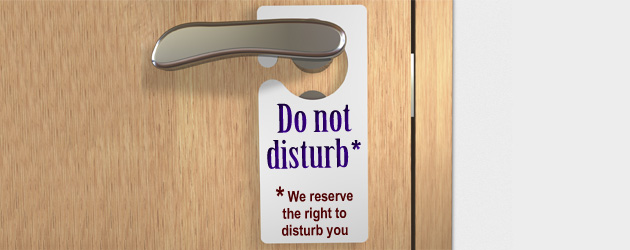
![]()
If there is one aspect about hotels that could fill an entire book, it’s the angst surrounding the mishandling of a guest’s ‘Do Not Disturb’ request. The absurdity surrounding the DND sign is so baffling, I just don’t know how to temper my hilarity.
The greatest of frustrations for travellers stems from the utter disregard to a concept that hoteliers find foreign: that some guests really want to use a hotel room to rest their weary bones.
Travellers arrive at their hotel after long-hours and tiring-queues (or is it tiring-hours and long-queues?). Guests are promised a ‘home away from home’. After being shunted and shoved, they look forward to the end-point: a room that they can call their own. They want territorial rights over their patch for a few days. Guests do not rent rooms. Instead, they fancy themselves as temporary owners. Sadly, upon arrival, they are reminded that they are not in charge of anything. ‘Sorry, the room won’t be ready until after 2:00 pm.’ More bossing about. More waiting. ‘Sign here. Would you like us to store your luggage while you walk the promenade like a vagrant?’ When guests (clients really) finally enter the room, they realise that the only power they have is to decide whether or not to place the DND sign on the door-handle.
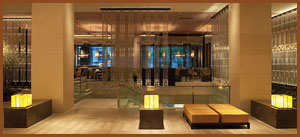 Before we accelerate to a frenzy, let’s start with some light relief. The Grand Hyatt Melbourne underwent a $45 million upgrade. I stayed at the hotel twice during the jackhammers and several times recently, and heaps of times previously. Judging by the noise and the dust, we were all expecting a Grander Hyatt. Indeed, the fixtures and fittings are lovely. But riddle me this: on what was the $45,000,000 spent? I would like to see the breakdown. What was the most expensive item? The sculpture? The consulting fees paid to the engineers? The builders and their labourers? The marble? Something must have taken the cake. What was the most expensive item? Now let us go down the list to find the least expensive item. What was it? I am going to stick my neck out and confidently guess that the cheapest, easiest, simplest, least complicated product to specify, to design, to outsource, and to manufacture, was the ‘Do not disturb’ sign. Alas, they stuffed it up, big time.
Before we accelerate to a frenzy, let’s start with some light relief. The Grand Hyatt Melbourne underwent a $45 million upgrade. I stayed at the hotel twice during the jackhammers and several times recently, and heaps of times previously. Judging by the noise and the dust, we were all expecting a Grander Hyatt. Indeed, the fixtures and fittings are lovely. But riddle me this: on what was the $45,000,000 spent? I would like to see the breakdown. What was the most expensive item? The sculpture? The consulting fees paid to the engineers? The builders and their labourers? The marble? Something must have taken the cake. What was the most expensive item? Now let us go down the list to find the least expensive item. What was it? I am going to stick my neck out and confidently guess that the cheapest, easiest, simplest, least complicated product to specify, to design, to outsource, and to manufacture, was the ‘Do not disturb’ sign. Alas, they stuffed it up, big time.
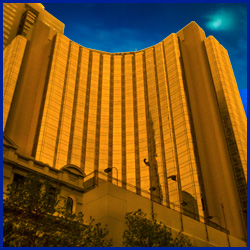 So, they spend $45 million. And for what? A better hotel? No. Just a shinier one, a larger one, a more luxurious one. A fancier one. A more stylish one. But is the hotel made better as a result of $45 million worth of marble, brass, crystal, and silk? Thrice no! The core of the business did not change. What is the core? To provide rooms for guests. Sure, the Hyatt makes money from food and beverage (or should I say beverage and food, in that order), and from laundry and functions, and parties and conferences. But what are all those 547 rooms doing up in the sky? The rooms are the core of the hotel. And part of the core is the promise of a restful sleep amidst ‘the epitome of luxury’ with a brand that says, ‘You’re more than welcome’. My goodness, what is it to be ‘more’ than welcome? The Hyatt mission says, ‘…provide authentic hospitality by making a difference in the lives of the people we touch every day…’
So, they spend $45 million. And for what? A better hotel? No. Just a shinier one, a larger one, a more luxurious one. A fancier one. A more stylish one. But is the hotel made better as a result of $45 million worth of marble, brass, crystal, and silk? Thrice no! The core of the business did not change. What is the core? To provide rooms for guests. Sure, the Hyatt makes money from food and beverage (or should I say beverage and food, in that order), and from laundry and functions, and parties and conferences. But what are all those 547 rooms doing up in the sky? The rooms are the core of the hotel. And part of the core is the promise of a restful sleep amidst ‘the epitome of luxury’ with a brand that says, ‘You’re more than welcome’. My goodness, what is it to be ‘more’ than welcome? The Hyatt mission says, ‘…provide authentic hospitality by making a difference in the lives of the people we touch every day…’
Clients not only want to sleep, but also want to watch TV and cuddle and make love and hide from the world while they lounge-about in their Calvin Kleins or in their birthday suit. This core activity is done in private, and, more importantly, at the client’s own pace. You see, humans look the same in their Rolex and Ray Bans, but on the inside, they operate at different speeds, and carry baggage that no-one will get to see. Some guests are there on business. Some arrive to attend a funeral. Some check-in with their heavy burdens, while others check-out with a lonely heart. Some are lost. Others are searching. They all carry the American Express card as they ebb and flow through the foyer, masking their complex lives with a smile. (After twenty years of membership, this week I destroyed my American Express card because I was fed-up with being treated like a number.)
Hotels have it tough. They are the last straw in a long line of inconvenience. Airports, traffic, late flights, cancelled connections, lost luggage, take your shoes off, empty your pockets, your bags are too heavy, sorry you can’t take that on board, sit-back, relax, and enjoy the flight, but first, turn everything off, and sorry we can’t land yet due to a badger let loose on the tarmac. (Last week, during some thunderstorms, our pilot said that we cannot leave the flight.
![]()
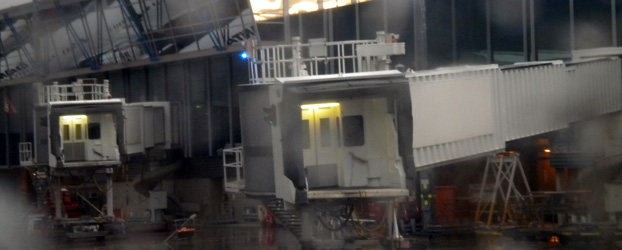
![]()
Click on the green arrow to play the recording of the pilot explaining this delay.
[audio:Imprisoned_on_the_flight.mp3]
![]()
Let’s get back to the Grand Hyatt Melbourne. After spending $45 million, they splurged on new ‘Do Not Disturb’ signs. This would have been the cheapest item on the list. A card with a string. Yet, this represents the most important aspect of the business: a client’s desire to cocoon, to rest, to hibernate, to escape, to unwind, to slow down, to play, to be left alone and consume the service in their own way. When guests place that DND sign, they are issuing a directive and an order. They are saying, ‘Unless the hotel is on fire, leave me alone, go away, don’t knock, don’t ring, don’t make noise outside, don’t chit chat, don’t bang doors and drawers next door, don’t go knocking on every door down the corridor while announcing, ‘Mini Bar!’ with the same sense of urgency as they used to cry, “Bring out your dead!”‘. That sign means, ‘Please tip-toe if you are in the area’. It means, ‘Don’t clang cutlery and crockery. Don’t disturb the peace.’ How else can I put it? ‘I want to be left alone. I want peace. I want quiet.’ Well, little chance of that! Click this to hear what I had to put up with on my last visit a few weeks ago. One of my managers felt that we were being too harsh on a hire-car company when our letter of appointment stipulated over forty specific requirements when they send a driver to pick me up. And now I just realised that I need to add a new item to the other list for hotels: I do not want a room that has an adjoining door. Here’s why… (This noise went on and on; made worse when the mother lost her temper a few times. The sound came through that door, as if the family were living inside my room.)
[audio:Baby_crying_next_door_Grand_Hyatt_Melbourne.mp3]
![]()
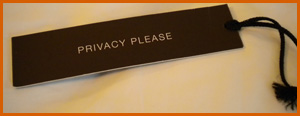 Let me test your powers of observation. Take a look at this, being the new sign that emerged after the $45 million upgrade. What do you notice? First, you can see the terminology. It is no longer assuring the guests that they will not be disturbed. It is simply saying that the hotel will try to give people privacy. Meaning what? ‘Please do not barge-in without knocking?’ Do you mean to say that if that sign were not displayed, our privacy would be violated? Language please! Whatever do they mean? Anyway, what else have you observed? Take a look at that string. Who designed it? Never let designers and decision-makers next to a project where they do not understand the end-user’s perspective. This product would have been a cinch to mock-up. It could have been road-tested within minutes. So why was it never tested? Why was it implemented? Why is it still being used?
Let me test your powers of observation. Take a look at this, being the new sign that emerged after the $45 million upgrade. What do you notice? First, you can see the terminology. It is no longer assuring the guests that they will not be disturbed. It is simply saying that the hotel will try to give people privacy. Meaning what? ‘Please do not barge-in without knocking?’ Do you mean to say that if that sign were not displayed, our privacy would be violated? Language please! Whatever do they mean? Anyway, what else have you observed? Take a look at that string. Who designed it? Never let designers and decision-makers next to a project where they do not understand the end-user’s perspective. This product would have been a cinch to mock-up. It could have been road-tested within minutes. So why was it never tested? Why was it implemented? Why is it still being used?
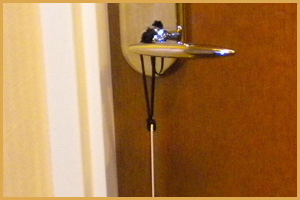 When hung on the door handle, the sign swings with the wind. No matter how you position it, it will move. The problem is, that on one side it says ‘Privacy please’ and on the other side it says ‘Please make up my room’. At one of the times I stayed at the hotel, the housekeeping staff disturbed me out of bed. When I mentioned the sign, knowing full well that the housekeeper was not to blame (much), the woman said that she can never be sure which way the sign was meant to face. And there you have it. A $45 million upgrade within one of the world’s most experienced hotel chains, and they can’t get the most important thing right. The most important things is a client’s rest, because they pay for a room in order to rest, otherwise they can just walk the streets all night long. Humans need to sleep. A sad and inefficient fact of life. So resting and not being disturbed while resting, is the most important aspect at the core of a hotel. Why won’t people grasp that concept? So I engaged in conversation with her. That’s a great way I conduct a lot of my research. Speak with people at the front line. The woman was powerless. If she had her way, she would get rid of these silly signs. They cause problems. Why can’t she walk into the General Manager’s office and point this out? Who knows. She could be weak. Or the culture could be so intimidating and so uninviting, that a lowly junior would never think to step outside her station. Yes we can blame the staff for not sticking their neck out about their observations. But come on… this is not a hidden problem in an isolated area. It is a sign that is hanging out in the open, for all to see. How many managers work at that hotel? Do they not have eyes to see? So please, let’s take it easy on the housekeeping staff and realise that the whole business lacks management skills.
When hung on the door handle, the sign swings with the wind. No matter how you position it, it will move. The problem is, that on one side it says ‘Privacy please’ and on the other side it says ‘Please make up my room’. At one of the times I stayed at the hotel, the housekeeping staff disturbed me out of bed. When I mentioned the sign, knowing full well that the housekeeper was not to blame (much), the woman said that she can never be sure which way the sign was meant to face. And there you have it. A $45 million upgrade within one of the world’s most experienced hotel chains, and they can’t get the most important thing right. The most important things is a client’s rest, because they pay for a room in order to rest, otherwise they can just walk the streets all night long. Humans need to sleep. A sad and inefficient fact of life. So resting and not being disturbed while resting, is the most important aspect at the core of a hotel. Why won’t people grasp that concept? So I engaged in conversation with her. That’s a great way I conduct a lot of my research. Speak with people at the front line. The woman was powerless. If she had her way, she would get rid of these silly signs. They cause problems. Why can’t she walk into the General Manager’s office and point this out? Who knows. She could be weak. Or the culture could be so intimidating and so uninviting, that a lowly junior would never think to step outside her station. Yes we can blame the staff for not sticking their neck out about their observations. But come on… this is not a hidden problem in an isolated area. It is a sign that is hanging out in the open, for all to see. How many managers work at that hotel? Do they not have eyes to see? So please, let’s take it easy on the housekeeping staff and realise that the whole business lacks management skills.
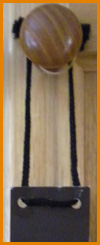
Twice I was disturbed by this stupid sign. So I stopped using it. I ripped the top half of the breakfast menu that one is supposed to hang on the handle. I wrote, ‘Do not disturb’ and hung it on the door, thinking that the instruction is explicit. Overnight, some helpful housekeeper had taken my make-shift sign and replaced it with one of the problematic ones. So I was back to square one. You could not script a funnier world. I was at the hotel again a few weeks ago, and they still use the signs, and have been doing do for over one year. I noticed that they had knotted them slightly differently, but the problem remains. Fix the bloody things. It must be the cheapest thing to fix. So easy, so cheap, so important. Why can’t anyone engage the brain? The Hyatt group runs 415 branded properties in 45 countries. That’s plenty of experience to be getting on with. Why can’t they sort out one a simple matter that affects every guest every time, big time. A small matter. A big problem. Easily fixed. No-one cares.
If the Hyatt is reading this article, allow me to show you how you can fix this problem in 20 seconds flat. Grab a hole-puncher from your desk, and hey-presto. See my sample in the photo on the left. Dead simple. Twice I was woken up! What’s the jolly point of hiring a bed to sleep on, when I cannot sleep if you keep waking me to ask if I need my room cleaned? Some hotels have strange shifts and weird performance measurements for their staff, which results in over-enthusiasm to get into a room and service it before a certain time, or at a rate of ‘so many rooms per hour’. Stuff the sleeping client. Hotels would be so much better without guests.
THE BLATANT DING DONG
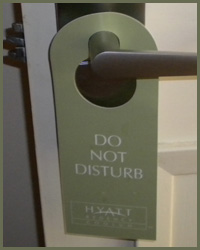 While staying at Hyatt Regency Coolum, I was woken to the sound of the doorbell. Here is how I describe the incident in a letter to the hotel: After that horrible first night, I managed to get to sleep at around 8:00 am. At 9:25 am, the doorbell rang. I called out, but no-one answered, so I went to the door in time to see the small buggy driving off. Outside my door were two totes, containing the fresh linen. I had the ‘Do not disturb’ sign hanging outside, so why did housekeeping deliver the linen and press the doorbell? …If a tree had fallen through the window, or if flooding had necessitated an evacuation, one would put it down to Mother Nature. If a gas bottle had exploded or if a buggy had ploughed through the door, one could understand human nature, and accept that unfortunate mistakes and errors do happen. However, a staff member ringing the doorbell, knowing that the guest was checked-in for three days, and knowing that there is no major function or conference to which one would need to rush, what can it be other than complete and utter disrespect? This was not an oversight. It was not an error. It was not an accident. It was not an inadvertent slip-up. This was not lack of training. It was nothing more than pre-meditated disrespect of the highest order, born of a management structure that boasts about world-class facilities, yet allows staff to break the codes of conduct and therefore destroy the Hyatt brand that hangs its hat on its understanding of the customer… Any person who shows a blatant disregard to hotel guests must also exhibit this level of disdain within other aspects of the business. This means that the colleagues and managers are blind, or they are all of the same ilk, to allow this type of behaviour to continue. (You can read my full report about Hyatt Regency Coolum here.)
While staying at Hyatt Regency Coolum, I was woken to the sound of the doorbell. Here is how I describe the incident in a letter to the hotel: After that horrible first night, I managed to get to sleep at around 8:00 am. At 9:25 am, the doorbell rang. I called out, but no-one answered, so I went to the door in time to see the small buggy driving off. Outside my door were two totes, containing the fresh linen. I had the ‘Do not disturb’ sign hanging outside, so why did housekeeping deliver the linen and press the doorbell? …If a tree had fallen through the window, or if flooding had necessitated an evacuation, one would put it down to Mother Nature. If a gas bottle had exploded or if a buggy had ploughed through the door, one could understand human nature, and accept that unfortunate mistakes and errors do happen. However, a staff member ringing the doorbell, knowing that the guest was checked-in for three days, and knowing that there is no major function or conference to which one would need to rush, what can it be other than complete and utter disrespect? This was not an oversight. It was not an error. It was not an accident. It was not an inadvertent slip-up. This was not lack of training. It was nothing more than pre-meditated disrespect of the highest order, born of a management structure that boasts about world-class facilities, yet allows staff to break the codes of conduct and therefore destroy the Hyatt brand that hangs its hat on its understanding of the customer… Any person who shows a blatant disregard to hotel guests must also exhibit this level of disdain within other aspects of the business. This means that the colleagues and managers are blind, or they are all of the same ilk, to allow this type of behaviour to continue. (You can read my full report about Hyatt Regency Coolum here.)
RING RING
At another time, while staying at Hyatt Regency Coolum, and the same goes for most hotels in which I have stayed, the staff seem to think that they can telephone a room to ask you if you really mean to have the ‘do not disturb’ sign out there. It’s like sending someone an email, and then phoning them to say I have sent you an email, and they text back to say that they received it and your send them a note of thanks via the post. How many brain cells does it take to work out that phoning a room to disturb, is as disturbing as ringing the door bell or knocking on the door (or barging in, if you please, as has happened to me often enough around the world). They just walk in. Before you know it, the staff are in your room. ‘What on earth are you doing?’ I yelled at a silly woman towering over me while at an expensive 5-star hell-hole in Singapore. ‘I need to lock the mini bar.’ I told her that my check-out time was 4:00 pm. Why is she disturbing me at 9:00 am? Waking me up, just by walking in, despite the DND sign outside. ‘Yes, but it is our policy to lock the mini-bar.’ How many murders have there been at hotels?
Anyway, back at Coolum, during another stay, someone phoned my room. When I picked up, the phantom caller hung up, without a word. This happens to me so often, it is not a joke. Housekeeping ring to check that you are in the room. They do not want to knock on the door because they know that the guest would bite their head off. Most hotels have a phone monitoring system whereby they can check every call. They ought to trace the call (which is easily done) and apprehend the staff member who engages in this unforgivable practice. A few weeks ago, while at Coolum again (my clients like to hold conferences near golf courses!) I had arranged for a late check-out. There are always very good reasons. So while trying to get one hour’s sleep, having been up working all night, the phone rang to ask me when I am checking out. My dear hotels, I have never stayed at a hotel where the front desk has ever communicated with the back end. Never. We go to great lengths to book a large conference. We stipulate everything. We ask for certain check-out times. We pay extra. We confirm. We fax. We email. We double check. We obtain signatures. We re-confirm. We have conference calls. We go over everything. We put it in writing. We prepare 30-page run-sheets that are colour-coded and highlighted and stipulated and specified and we go through everything personally with the AV people, the functions people, the events people, the staging folk, the catering staff, the hotel manager, the beverage manager… and on it goes, and never has any one department communicated with another because after all that anally-retentive, fussy finicky detail, we rock up to the hotel and they are scratching their head to locate our booking and they have nothing as planned. Not a single thing. No AV, no monitor, not the microphones we ordered, and only one not four as agreed and paid for. No room allocations as agreed as per our requirements. No-one knows where the boxes are stored. No possibility of a late check-out despite it being agreed to suit our flights and the fact that I get off the stage at 5 pm. ‘Nope, our check-out time is 11 am. Sorry. We moved your bags out of the room,’ she says. Never mind that I need a shower. How bloody dare they! Hey, don’t worry. It happens all the time. No really. All the flipping time. Unbelievable. Just so that you do not think I am exaggerating, I have to make sure you get it: it happens all the jolly time. And the response: ‘Sorry, no one told me about it, and there is nothing we can do. Your event starts at 9:00, and the equipment you want is at the other end of town, and it will take three hours to set it up. If you had told us last night…’ How many stranglings take place at hotels?
And everyone wonders why the CIA was not communicating so well with the FBI at the time of the terrorist attacks on New York and Washington. Those terrorists were known. They were apprehended, and they were let go and let loose because the left hand did not know what the right hand was doing. If the reception staff cannot advise the housekeeping staff (or anyone else for that matter), that the guest has a check-out at 4:00 pm, then how do you expect one government bureaucracy to communicate with a totally foreign external bureaucracy? These hotels seem to have every policy under the sun, but none that says, ‘Dear staff member, please use you miniscule brain. That’s what we pay you for.’
NEVER USE A DOUBLE-SIDE DND SIGN
The oldest trick by housekeeping staff is to remove the DND sign, slowly turn it over to the side that reads, ‘Make up my room’ and then knock on the door. If the guest protests about being woken out of bed, the staff would point to the sign and say, ‘Sorry, it’s just that you had indicated that you wanted your room made up.’ At which you will say, ‘No go away!’ at which they will be glad and happy because that is one less room they have to clean, so less work for them! Delicious strategy.
So here is a better way. Use two different signs. One green that on both sides says, ‘Make up my room’. And one red that says on both sides, ‘Do not disturb’. Mind you, although this is a great step in the right direction, sadly, staff now pinch the signs and then knock on the door and insist that there was no sign! You just can’t win.
WHAT ABOUT THE NEW TECHNOLOGY?
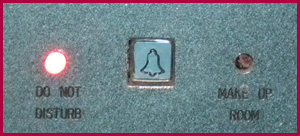 Indeed, some hotels have done away with these signs. They place a button in the room, and a light system outside. If the guest presses the DND button, a light illuminates outside. In this way, housekeeping can never say that the sign had been stolen. Does this system work? Not at all, especially at the Rendezvous Hotel in Auckland. Read that article here. Why not review the websites of all the major hotel brands. Within those welcoming promises of bliss and joy, there are clues as to what hotels are all about. I am not asking for miracles. I do not expect people to be perfect. But I do think that we can go a long way if we start by removing staff who have no regard for the most basic tenant of any hotel: REST. I like four-letter words.
Indeed, some hotels have done away with these signs. They place a button in the room, and a light system outside. If the guest presses the DND button, a light illuminates outside. In this way, housekeeping can never say that the sign had been stolen. Does this system work? Not at all, especially at the Rendezvous Hotel in Auckland. Read that article here. Why not review the websites of all the major hotel brands. Within those welcoming promises of bliss and joy, there are clues as to what hotels are all about. I am not asking for miracles. I do not expect people to be perfect. But I do think that we can go a long way if we start by removing staff who have no regard for the most basic tenant of any hotel: REST. I like four-letter words.
For other observations about the Grand Hyatt Melbourne, click here.


Comments are closed.